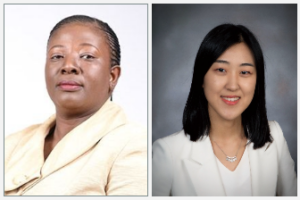In the African country of Botswana, nearly two-thirds of people diagnosed with cancer will die of the disease.
The main reason 63 percent of the country’s cancer patients don’t survive is that most aren’t diagnosed until their disease is at an advanced stage, when it’s unlikely to be cured or controlled with treatment.
Cancer shouldn’t automatically be a death sentence or a hopeless journey. However, in Botswana and throughout sub-Saharan Africa, cancer prevention and oncology care are negatively affected by an array of factors: lack of specialized health personnel, inefficient processes throughout the health system, deficient screening and diagnostic services, and substandard treatment options, among other challenges.
To confront these complex issues, a new training program called Cancer Kitso is being developed for health care workers. The training program’s goal is to improve cancer care and prevention capabilities throughout Botswana and, eventually, other countries in Africa. It is an initiative of the Botswana-Rutgers Partnership for Health, which is a collaboration among the Government of Botswana, University of Botswana, and Rutgers Global Health Institute.
Cancer Kitso is modeled after KITSO AIDS, Botswana’s national training program for HIV/AIDS treatment and care that was established more than 20 years ago to respond to the disease epidemic in the country. The word kitso means knowledge in the local Setswana language. Cancer Kitso is critical to meeting the country’s grave need to strengthen its health system and provide comprehensive, patient-centered oncology care. The training program was piloted in Botswana with support from Bristol Myers Squibb. The pilot sessions took place in person and virtually from September through November 2022.
Creating the Curriculum
To design the Cancer Kitso training curriculum, the Botswana-Rutgers Partnership for Health formed several working groups. These groups comprise clinical subject matter experts who are faculty and staff in Botswana’s Ministry of Health, Princess Marina Hospital, and University of Botswana and at Rutgers’ Ernest Mario School of Pharmacy, Robert Wood Johnson Medical School, Rutgers Cancer Institute of New Jersey, Rutgers Global Health Institute, and School of Nursing. Their work also has been facilitated by curriculum development specialists from the University of Botswana.
The groups met regularly to create original content for the training program, which is organized into sessions:
- “Cancer Basics and Navigation from Symptoms to Treatment Planning”
- “Cancer Treatment Modalities, Drug Therapies, and Adverse Events” (Part I and Part II)
- “Therapeutics for Palliative Care and Pain Management”
- “Putting it All Together: A Patient’s Journey in Oncology Care and Strengthening Health Systems”

Pharmacists Joyce Kgatlwane (left) and Jiyeon Joy Park are among the group that developed the “Cancer Treatment Modalities, Drug Therapies, and Adverse Events” sessions for the Cancer Kitso training program.
Pharmacists Joyce Kgatlwane and Jiyeon Joy Park are among the group that developed the “Cancer Treatment Modalities, Drug Therapies, and Adverse Events” sessions. Kgatlwane is a lecturer in the School of Pharmacy at the University of Botswana and has been involved with the Botswana Ministry of Health for decades, including as a trainer and mentor for KITSO AIDS. Park, a core faculty member of Rutgers Global Health Institute, is a clinical assistant professor at Rutgers’ Ernest Mario School of Pharmacy and a clinical pharmacy specialist for oncology at Rutgers Cancer Institute of New Jersey.
Kgatlwane and Park discuss their roles creating content for their sessions, which cover the following topics: principles of surgery, radiation therapy, and systemic therapy, the latter of which includes chemotherapy, hormonal therapy, and targeted therapy; side effects and adverse effects of chemotherapy; the use of supportive care agents, such as drugs to lessen the harmful side effects of cancer treatment; patient management during and after treatment; and prescribing considerations.
What are some of the broader themes related to oncology care that you cover in your course sessions?
Joy Park: Our training content emphasizes looking at the patient as a whole and how to consider more than just treating the cancer itself. We’re trying to teach beyond the pure didactic knowledge, as there’s already guidelines for that: which medicines to give for a specific cancer. Our training incorporates how to assess a patient’s pre-treatment condition—for example, if they have a history of poor kidney function or have low blood counts, the chemotherapy may have to be adjusted, delayed, or substituted with an alternative agent—and how to monitor and evaluate them during the course of their cancer treatment.
Joyce Kgatlwane: Most cancer medicines may cause adverse effects. We really try to bring in that comprehension—not only are you looking at the patient, that they have this illness, but also anticipating what adverse effects may be associated with certain medicines. We’re teaching about how such adverse effects can be prevented and detected, as well as how to manage the patient when the adverse effects are unavoidable.
We’re also addressing the importance of dosage calculation for chemotherapy. Some of the medicines are dosed based on the patient’s body surface area, a measurement obtained using a mathematical formula that incorporates the patient’s height and weight, which can change over time. Therefore, there is a need to individualize the doses of chemotherapy medication.
Case-based learning is an important component of the Cancer Kitso training program. How did you incorporate patient cases into your course sessions?
Park: Mock cases help to teach about decision-making based on medication availability. When we were writing about medications for chemotherapy-induced nausea and vomiting, I took for granted all the medications we use here in the U.S. Some of them are not available in Botswana, so the cases can address how to navigate different scenarios based on a patient’s needs and available resources.
Kgatlwane: This kind of training, we really hope it will facilitate and promote teamwork in the form of interprofessional, multidisciplinary team-based care. Here in Botswana, especially for cancer, you’ll find that doctors and nurses are always rallying around the patient; as pharmacists, we might just come in, prepare whatever we have to prepare, and give it to them. Even when cancer cases are discussed, you rarely find pharmacists being part of the team.
As Park said, Cancer Kitso training is intended to promote team-based care throughout a patient’s whole experience. Cases are important teaching tools, built to punctate the didactic lectures. They encourage the participants to interact and to evaluate their responses.
What are some of the challenges that exist in Botswana with respect to patient-centered oncology care across different facilities?
Kgatlwane: Communication and collaboration are vital, within and between facilities. For instance, while we have various hospitals that have the capacity to manage patients with cancer, the main gap is that many of our country’s health care providers do not have adequate skills to manage their [cancer] patients effectively. Most of our pharmacists have not had specialty training in oncology. Even the doctors and nurses in some of these hospitals, where we expect the patients to be managed, they refer them to higher-level facilities for their cancer care, and then those facilities are overwhelmed.
Another area where communication has to be strengthened is the referral system—ensuring that it is a two-way system. This includes when a higher-level facility, for example, a tertiary facility, has stabilized a patient and is referring that patient to a secondary facility for continued care. They should communicate and make sure that, where this patient is referred to, there is preparation there to be able to continue that patient’s care. The referring facilities also should empower the secondary facilities to recognize the monitoring and evaluation parameters that are necessary and to avail the medications that the patient may need.
The Botswana-Rutgers Partnership for Health involves people who work in clinical practice and higher education. How does this impact the Cancer Kitso program—and your own perspectives on this type of collaboration?
Kgatlwane: I appreciate the synergy that’s formed between people from academia and those from clinical practice. It really enriches what will eventually come out in the training material we are developing. To compare with when we were doing KITSO AIDS training, at that time, I did not have experience from an academic institution. I was bringing my practice-based teaching, which didn’t include the expertise that I have now, having been at the University of Botswana for eight years.
With Cancer Kitso, we want the program to become accredited. We have been very focused on ensuring the training content addresses the stated learning objectives and outcomes, and we’re emphasizing adult learning delivery models. Academia brings expertise on the delivery of material, while the clinical practice sites bring the day-to-day and case development expertise.
Park: Our collaboration comes through on many levels, and I learned a lot through the process. I didn’t know what to expect walking in, working and cooperating with a whole different country, essentially. I relied heavily on our Botswana counterparts’ expertise about protocols and what’s available, in terms of the medications and equipment needed to prepare or administer it. I constantly checked with them on if I was writing relevant material as I developed my part of the content.
Cancer Kitso is being developed in ways that will allow for other countries in sub-Saharan Africa to adapt the curriculum for implementation in their own settings. How are your course sessions incorporating this nuance?
Kgatlwane: When developing the material, we have to be realistic about what is available in developing countries in terms of the medicines and equipment. However, we also incorporate information about new medications, when possible, to provide flexibility in case they are available in other countries.
Park: My own professional experience is based on practices and standards in the U.S., so I was constantly considering how to adapt the curriculum content for the Botswana setting. The Cancer Kitso team members also have been striving to keep the curriculum applicable to other regions of Africa. It is still a work in progress, as each institution has different availability of medications and different practices.
Kgatlwane: Overall, the training material is easy to adapt. The delivery of the material utilizes various strategies, including face-to-face, online, and hybrid of the two, which should facilitate even choosing the delivery methods in other settings and countries. In addition, the concept of patient-centered care is adaptable, so we believe other countries will be able to relate to the content and its delivery.

